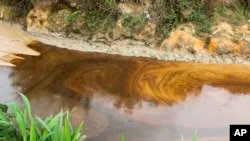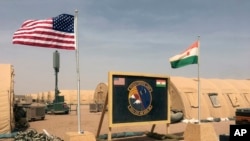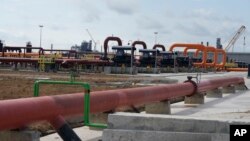The implications of the U.S. military withdrawal from Niger — increasingly backfilled with Russian troops — have become the subject of a heated public discussion in the West African region.
In March, Niger’s junta announced it was breaking off its decades-long military alliance with the U.S. “with immediate effect” and demanded the withdrawal of nearly 1,000 U.S. troops stationed in the country.
U.S. Secretary of Defense Lloyd Austin confirmed on May 3 that Russian military personnel have installed themselves at the American airbase in Niger. The Kremlin rebranded the notorious Wagner Group as the Africa Corps after the failed rebellion and death of its funder, Yevgeny Prigozhin, last August.
Some West Africa watchers, like Colin P. Clarke, the director of research at the Soufan Group, a global intelligence and security consultancy, expressed worry that the growing Russian presence in the Sahel, invited in by the military juntas that have ousted several democratically-elected governments, will only worsen the violence that is surging throughout the region.
“My concern is that if the Russians come in … they continue to make the terrorism problem worse, not better, and then when they’re done extracting what they want to extract, they’re going to pack up and go home, and this place is going to look like a nightmare, ” Clark told Foreign Policy magazine.
Others, like Nigerian investigative journalist and filmmaker David Hundeyin, say the U.S. never cared about protecting Africans from violent extremists but placed its troops in the Sahel to “ensure the flow of Africa’s natural resources,” the same as the “old colonial military bases.”
In a viral debate on X, on May 5, Hundeyin argued that:
’’American foreign policy sees the Uranium in Niger… the oil in Escravos and the lithium in Kogi as valuable assets… A U.S. military base anywhere in Africa serves EXACTLY the same purpose that the old colonial military bases did - to protect the flow of African resources, and not the lives of African people which America considers to be less than worthless.”
That is false.
Far from robbing the Sahel region of its natural resources, the United States has invested in strengthening its security more than any other foreign nation. Between 2001 and 2020, the U.S. dedicated $3.3 billion to the Sahel and trained at least 86,000 counterterrorism troops in the region, including nearly 18,000 in Niger. That is more than all other foreign nations combined.
U.S. long- and short-term civilian assistance in the region remains a significant source of food security, energy, agriculture, and transportation. In 2022 alone the U.S. spent about $11 billion in the African region, including $1 billion aid in humanitarian assistance to people affected by conflicts, floods, droughts, famine, and other disasters in the Sahel region, which includes Niger, Burkina Faso and Mali.
Niger is also one of the biggest beneficiaries of USAID’s programs through the Bureau of Humanitarian Assistance.
As for the U.S.’s role in extracting Africa’s natural resources: China, France, Japan, and Spain are the largest extractors of uranium in Niger. China is also the single largest harvester of Nigeria’s lithium. Two private U.S. companies, Chevron and Exxon Mobile, are involved in Nigeria’s oil production through local subsidiaries.
Nigerian oil
The Nigerian government controls all sectors of the nation’s oil and gas industries through the Nigerian National Petroleum Corporation, NNPC, the largest oil producer in Nigeria that operates under joint ventures with about 50 gas and oil companies.
The Escaravos GTL (gas to liquids) plant that Hundeyin named in his X post is a local subsidiary of the U.S. private firm Chevron and has a 75% share of that plant’s production in partnership with NNPC, which controls the remaining 25%.
Apart from Chevron, the top five oil and gas companies operating in Nigeria include a Nigerian government-controlled subsidiary of the British Shell Energy Nigeria; a Nigerian government-controlled local subsidiary of the U.S. Exxon Mobil; a Nigerian government-controlled subsidiary of French firm Total Energies and Italian Eni Spa; and Equinor ASA, another Chevron subsidiary, co-owned by a local firm, Prime 127 Nigeria Ltd.
Nigeria lost to corruption and mismanagement an estimated $35 billion in oil revenues between 2019 and 2022.
Eni Spa, Exxon, Shell, and TotalEnergies have all sought to exit Nigeria's oil-rich Niger Delta in recent years, citing security concerns, including theft and sabotage, to focus instead on deep-water drilling.
Nigerian lithium
According to public records, the U.S. government has zero involvement in the mining of Nigeria’s lithium.
When Tesla, a private U.S. company that manufactures electric vehicles, expressed interest in forming a trade relationship with the Nigerian government to mine lithium, Nigeria declined the offer, conditioning the agreement on Tesla’s establishment of a battery factory in Nigeria.
In February 2023, the Nigerian government awarded a contract to build the country’s first lithium-processing plant to China’s Ming Xin Mineral Separation Nig Ltd. (MXMS), making it the single-largest lithium harvester in the country. China proposed a plan to manufacture batteries for electric vehicles (EVs) in Kaduna, a state in northwestern Nigeria, projected to yield 18,000 metric tons of lithium daily.
Nigeria's Minister of Solid Materials Dele Alake said that "…no company would be allowed to mine and export raw lithium unless they set up processing and refining plants in Nigeria."
As of January 2021, the Nigerian government had licensed 185 local companies to commence extraction of lithium in Nassarawa, Kogi, Kwara, Ekiti, and Cross River States.
Nigerien uranium
Hundeyin’s suggestion that the U.S. government has stakes in Niger’s uranium is also false.
Niger’s Ministry of Mines has on its website a list of five companies licensed by the Nigerien government to mine uranium. The list does not include any U.S. firms. Instead, the Nigerien government is the major shareholder, partnering with Chinese, French, Spanish, Japanese, and South African companies.



